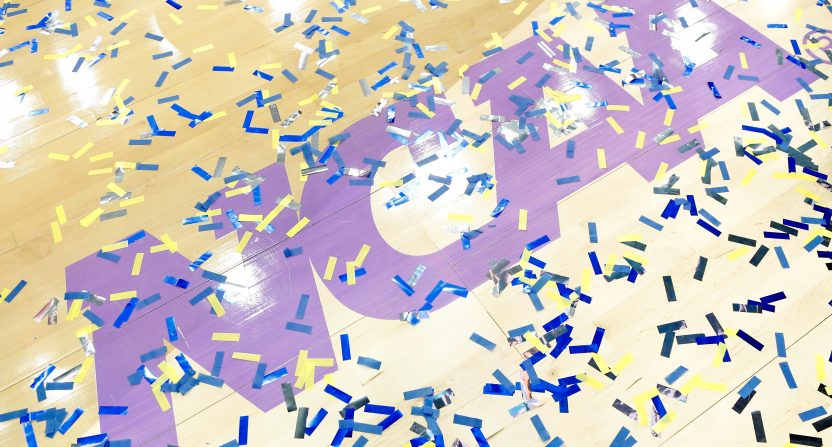At a time when the NCAA is facing an unprecedented number of legal challenges to its amateurism model, the association might finally be losing its biggest asset: public opinion.
According to a new poll, 40 percent of people say that college athletes deserve something beyond their athletic scholarships. That’s a massive increase from previous years. According to Seton Hall Sports, that’s an 11-percentage point increase from 2013, and an increase of nine percentage points from a different poll in 2014.
That’s not a trend line the NCAA wants to see.
A disclaimer right now: I am a staunch advocate for paying college athletes. I was once a die-hard college football fan who thought that paying college players would destroy college sports, and thus was staunchly against it. However, I eventually realized that schools make far more money than they claim, hide profits, don’t offer real educations to athletes, and lie in court to continue to stuff their coffers. With revenues still rising, college athletics executives give themselves massive raises and hire unneeded support staff to appear broke in financial reports so they can continue to trick the public into thinking that paying athletes would destroy college sports.
Amateurism is not a principle; it’s whatever the NCAA decides it is that day. One day it was nothing beyond an academic scholarship, then nothing beyond an athletic scholarship, then nothing beyond the cost of attending a university. It’s a nostalgic tool used by the NCAA to give schools absolute power over their athletes, and its definition changes whenever there’s even the hint of a new revenue stream.
Consider the words of former NCAA president Walter Byers: “This is not about amateurism. This is about who controls negotiations and gets the money.”
If you are still unconvinced, read economist Andy Schwarz’s 13 myths about paying college athletes. There’s a good chance your reason against it can be refuted by facts.
The idea of paying college athletes for their labor—and the recognition that they’re actually employees of their schools, with scholarships contingent upon their participation in athletics—has become far less taboo in recent years, particularly within the industry. That’s thanks to players being willing to speak out.
Wisconsin basketball star Nigel Hayes is currently suing the NCAA for its restraint of trade. Former Northwestern quarterback Kain Colter led an initially successful effort by Wildcats football players to unionize. Shabazz Napier, the star of UConn’s 2014 NCAA Tournament run, successfully got the NCAA to give in and allow schools to give their players unlimited food. These days, athletes are hyper-aware that they’re being used by the NCAA for commercial gain, particularly during its $1.1 BILLION per year NCAA Tournament. They’ll drop casual comments like this.
Hell of a game. We made a lot money for the NCAA today. – Theo Pinson pic.twitter.com/OgrM4TzJWf
— Nick Carboni (@NickCarboniWCNC) March 27, 2017
All of this is important because these high-profile players can change public opinion, which has shown to be the most important way to shape the court’s opinions on the topic. That’s not the way it should be, but it’s how the judges have acted.
During the famous Ed O’Bannon case, district judge Claudia Wilken wrote a scalding rebuke of all of the facts the NCAA used to defend amateurism, but decided to only allow athletes to receive up to $5,000 per year (put into a trust) because, well, more than that would feel kind of weird to her. The appeals court judges reversed her ruling because even though they agreed with Wilken on many of the facts, they found that Wilken ignored that “not paying student-athletes is precisely what makes them amateur,” as if the ever-changing definition of amateurism is itself the legal standard by which antitrust law operates, not the definitions of restraint of trade and exploitation under the law.
This phenomenon of courts largely agreeing that the NCAA is exploitative and won’t actually be damaged by paying athletes, while still ruling that, for now, the association can still largely conduct business as usual, shows just how important judges’ own biases, based on their own experiences outside of the courtroom, are in deciding cases.
Schwarz and I wrote in detailed this in The Mythology Playbook: Procompetitive Justifications for “Amateurism,” Biases and Heuristics, and “Believing What You Know Ain’t So.” To summarize 44 pages, behavioral economics research tells us that the public opinion that shapes our views can hinder our ability to consider contrary facts. The O’Bannon rulings demonstrate that.
If humans were truly rational, the argument that the enforcement of amateurism is necessary for college sports to exist would falter under a factual barrage. This premise nevertheless remains axiomatic in the NCAA’s defenses against antitrust remedy.
This is why the sudden shift in favor of paying college athletes—a position backed by facts but not by the NCAA’s 100-year head start in shaping public opinion of what college athletics really is—is so striking and so encouraging.
Soon, the people in the courts will be living in a public in which the opinion favors allowing athletes the same rights as all other students to profit off of their talents and keep some of the money they make for their employers. When that day comes, it won’t just be the facts that contradict the NCAA’s amateurism defenses; it will also be the biases that shape judges’ world views outside of the courtroom.
That’s why, if the trend of shifting public is any indication, it’s only a matter of time before the NCAA’s exploitative business model shatters.







